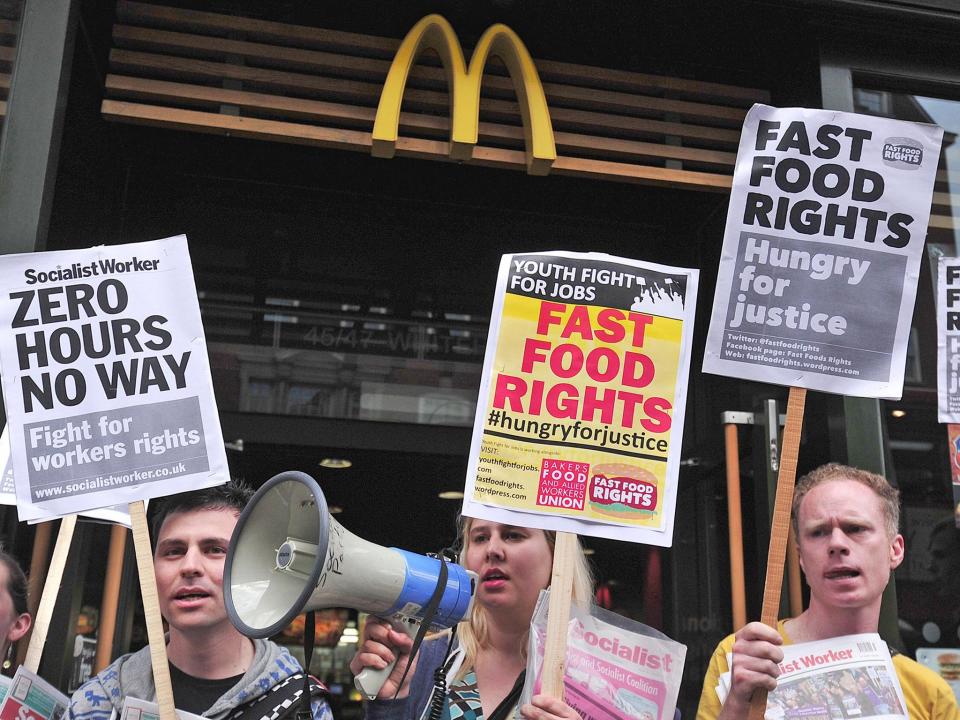The 'right to request' full-time hours won’t do anything to help workers on zero-hours contracts

Faced with evidence of a rising tide of exploitation in British workplaces through an explosion in the use of zero-hours contracts, the Government had to act.
So, as governments do, it commissioned a review into the problem, led by an establishment worthy, in this case Matthew Taylor, the chief executive of the Royal Society of Arts, at the head of a four-strong panel.
“Today, the team behind the Taylor Review into Modern Employment Practices announced they will travel the country, talking to employees and employers about the UK’s labour market,” its members declared at the outset.
Having done that, the BBC is now reporting that the review has come to the conclusion that “some workers might be being exploited by businesses”.
A startling insight that is similar to “discovering” that if you look at the sky on a sunny day you might get dazzled.
Fear not, however, for the Taylor review has apparently found a solution that ought to be worth, I don’t know, an OBE? An MBE? I can never work out how they’re ranked.
Unfortunately it’s going to have about as much impact on one of the biggest problems facing the British labour market as the wearing of non-tinted lenses has on the dazzling effect of our host star.
Workers, we are told, should in future be granted the right to “request” fixed hours, along the lines of the existing right to request flexible after, say, having a child.
The panel, it seems, has paid close attention to what happened at McDonald’s, which offered its workers the option of fixed hours and found that some 20 per cent said thanks very much.
The thing is, McDonald’s is a big company with a high profile brand that is sensitive to its public image.
Problems with zero-hours contracts are more likely to occur at, say, warehouses in out of the way places where the staff are hired through shadowy agencies that ruthlessly exploit them.
Those workers already have the right to request fixed contracts. They can knock on their boss’s door and ask. The only thing that will change in the wake of the Taylor review is that bosses might, in future, have to “justify” their decision to say “no, and if you don’t like it, get yourself down to the Job Centre Plus”.
So in a few months times, if the review’s recommendations are taken forward by ministers, employers might have to give a polite refusal.
“Dear Employee, we have considered your request for fixed hours and unfortunately we are unable to grant it at this time because of requirements of the business in the current trading environment.
“We understand that the Job Centre Plus has a range of employment opportunities that may be more suited to your personal circumstance, and we would urge you to take the time to consider them out of working hours. ABC Employment Agency will have your P45 with you by the end of the week.”
No, most employers wouldn’t be so stupid as to include the second part in a formal letter.
But even if they did, it might not matter.
You have to have two years continuous employment to be able to bring a case for unfair dismissal before an employment tribunal, which rules out many people on zero-hours contracts.
Even those that somehow manage to qualify face fees of £1,200, thanks to reforms introduced by the Conservative Government, a sum plenty of fixed-hours workers on good wages would struggle to rustle up after being fired, let alone those who have been getting by on insecure incomes.
Those on zero-hours contracts can, in effect, be fired at will, and even if that doesn’t happen, “trouble makers” can easily find themselves denied the hours they need.
As such, it’s hard to see many zero-hours workers, or even any zero-hours workers, chancing their arms to make the request they are set to be accorded the “right” to.
It shouldn’t surprise anyone that the Confederation of British Industry, which represents employers, quite likes the idea. It won’t change much for its members.
The Government will, meanwhile, probably hail the Taylor panel as having made “an important contribution”. Ministers will be able to state that they have taken the issue seriously at parliamentary questions, even though, in reality, they haven’t. Does anyone see a smokescreen out there?
What is the net impact these proposals will have on one of the biggest challenges facing the British labour market if the BBC’s report is indeed correct? Shall we use a scale, like those market research people are inordinately fond of, where 10 equals “super effective”? I don’t know about you but I’d give them zero. And that’s being generous.

 Yahoo News
Yahoo News 